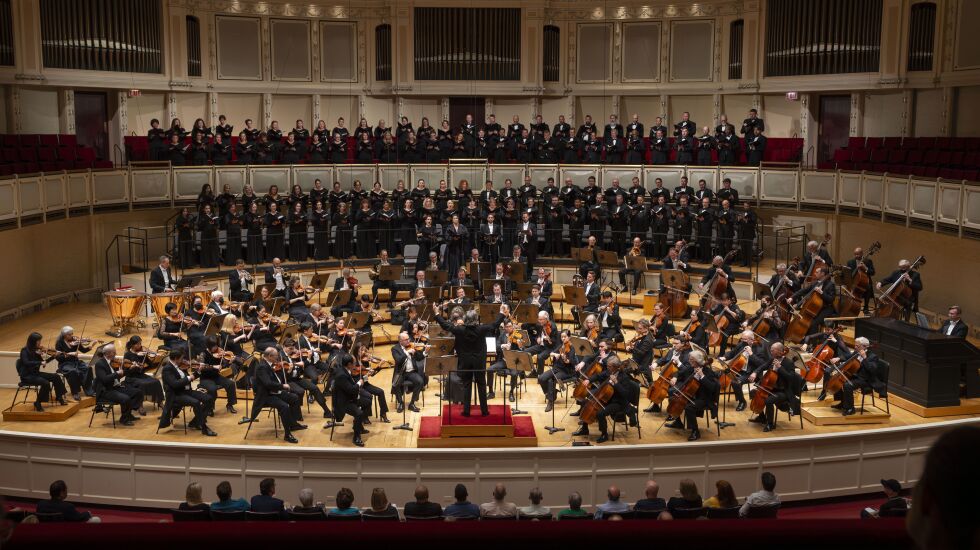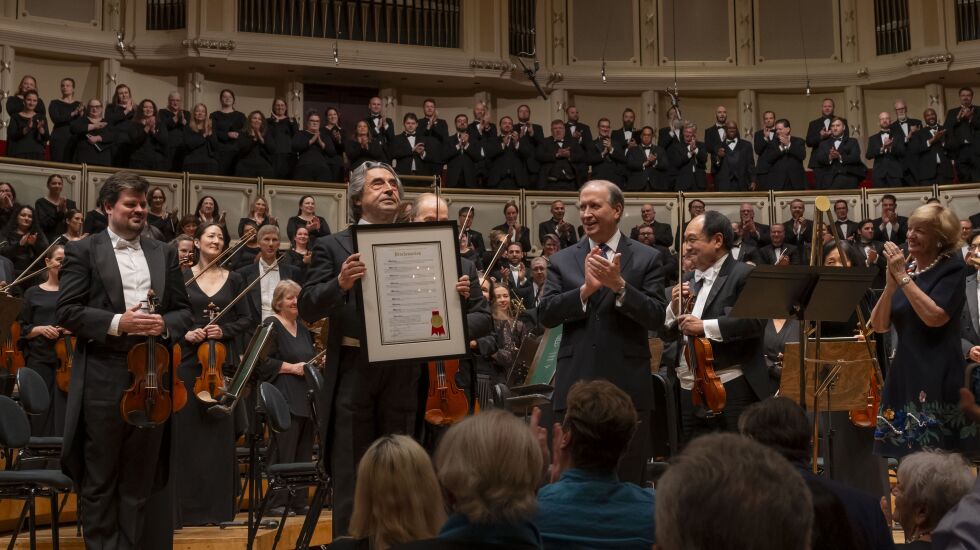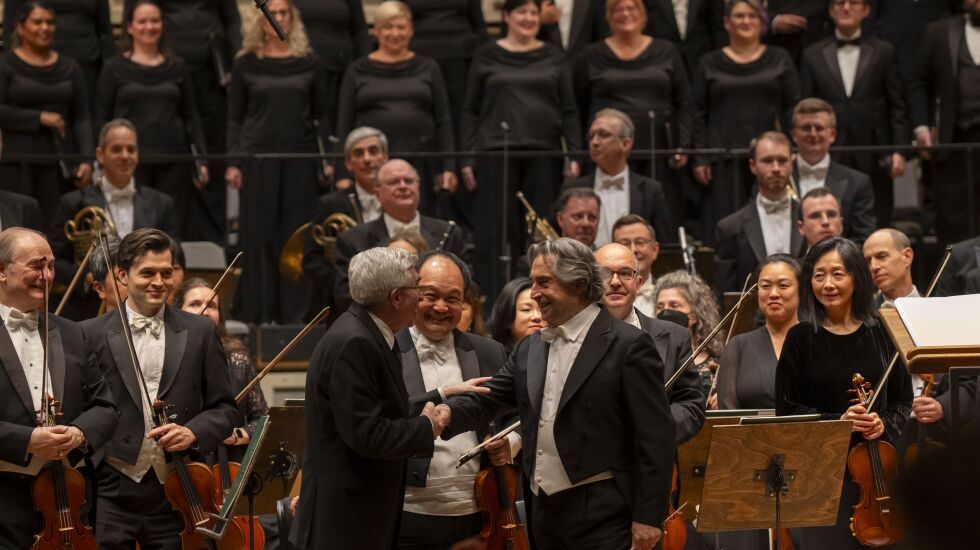
For most of the 2022-23 season, Riccardo Muti has downplayed his departure as music director of the Chicago Symphony Orchestra after 13 years, sticking to the more or less normal fare we have come to expect of him, in part because the maestro is in no way leaving for good. He will still have a strong presence with the orchestra in coming seasons.
But any sense of normality came to end Friday evening, as Muti culminated his official tenure at Orchestra Hall with a towering triumph. In the first of a set of three performances, he and the Chicago Symphony Orchestra and Chorus presented a powerful, probing and deeply affecting take on Ludwig van Beethoven’s “Missa Solemnis (Solemn Mass)” in D Major, Op. 123.
(As a kind of encore or postscript, Muti will lead a free “Concert for Chicago” at 6:30 p.m. June 27 at the Pritzker Pavilion in Millennium Park.)
This extraordinary 1819-23 masterwork, perhaps the composer’s greatest, is too often overshadowed by the over-played Symphony No. 9, and many ensembles avoid it because of its massive scale and technical difficulties.
Even Muti set it aside for nearly the entirety of his career, worried that he wasn’t up to the artistic and emotional demands of the piece. But he finally decided it was time, and he was set to take it on during the CSO’s 2020-21 season.
But those concerts had to be cancelled because of the COVID-19 pandemic, so Muti wound up leading the “Missa” for the first time in August 2021 with the Vienna Philharmonic at the Salzburg Festival.

But considering that he had spent so much time preparing this setting of the Latin mass and had those performances under his belt, it only made sense to schedule the work on this momentous occasion. Expectations were off the chart for this milestone concert, and Muti and his collaborators met and arguably even surpassed them.
As the concert came to a close, it seemed strange that no on-stage acknowledgement of Muti’s departure had been made. But, finally, after multiple ovations and some attendees had already left, Jeff Alexander and Mary Louise Gorno, the Chicago Symphony Orchestra Association president and chair, respectively, came on stage.
What came next was hardly a surprise. They split the reading of a wordy board proclamation that declared Muti the orchestra’s music director emeritus for life, and the audience cheered as he held up the framed document.
The smiling maestro took the microphone and thanked the orchestra for a relationship that began in 2007 when he first returned to guest conduct and lead it on a European tour. They developed a “mutual respect,” he said, that has endured to this day, praising the ensemble’s “really wonderful music-making.”
Then the fun began, as he displayed his trademark sense of humor, offering mock concern that everyone will groan and say in September, “Oh, he is here is again.” Indeed, to change things up and not wear out his welcome, he jokingly said he might go casual and wear short trousers and a yellow hat. Finally, he said, “That’s it,” and his remarks were over, but the applause continued.
Like everyone, Muti has his limitations. He is not exactly an adventuresome programmer and he is little interested in innovations in terms of venue and format, but the CSO did not appoint him to do any of those things.
No, Muti was hired in 2008, because he was unequivocally one of the world’s great conductors, who brought an amazing link to the past. At the same time, he is a technical perfectionist and an interpreter of emotional depth and intellectual sophistication.
All those qualities were richly on view Friday. The “Missa” does not exude the operatic fervor of Verdi’s Requiem Mass or the visceral thrills of Beethoven’s Symphony No. 7. Here the emotions are more turned in, and it requires a performance that has punch but is ultimately more reflective and not overdone. No extreme fortissimo blasts, no showy flourishes.
And that is exactly what Muti delivered — an interpretation that was measured in the best sense of that word, one that was unhurried and one that steadfastly bored into this piece and inhabited it in a deeply profound and meaningful way.
Muti has always been good at conveying the over-arching scope of sweeping works like the “Missa” while also zeroing in each phrase, each bar and sometimes each note, with his awareness here of the big and small audible throughout the full breadth of the piece.
As superb as the orchestra was in this performance, including memorable moments from individual musicians like concertmaster Robert Chen’s extended solo in the Sanctus, the real star of this concert was the orchestra’s magnificent chorus, which has never been better.
Expertly prepared by guest chorus director Donald Palumbo, these 106 singers excelled in what Muti in his post-concert remarks called the “most absurd piece ever written” because of its extreme technical demands, especially its unlikely leaps in pitch and its sometimes lightning passagework. But these singers were seemingly unfazed, handling it all with nimble dynamic control, clear diction, spot-on intonation, impeccable blend and a full-bodied, multifaceted tonal palette.

Unlike, say, Handel’s “Messiah,” in which the vocal soloists have extended solos, they are much more a kind of extension of the chorus here, often merging into that bigger body, and usually performing together, trading words and passages.
As he so often does, Muti adroitly selected four top-notch singers — soprano Erin Morley, mezzo-soprano Alisa Kolosova, tenor Giovanni Sala and bass-baritone Kyle Ketelsen. They had the vocal power to be heard amid the giant forces around them and, most important, blended as a cohesive and compelling quartet.
In short, this stupendous performance put an exclamation point on a dazzling era in the history of the CSO. As Muti has rightly said, it is all too easy to harm the virtuosic playing level of an orchestra of the caliber of the CSO, and much more difficult to maintain and enhance it.
Without question, Muti has done the latter, leaving the orchestra in a better place than he found it and leaving all of us with plenty of irreplaceable musical memories. Thank you, maestro for all you have done for this orchestra and Chicago. We look forward to seeing you back this fall.







